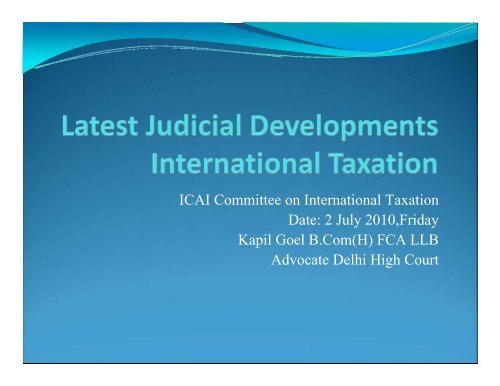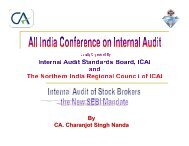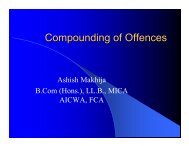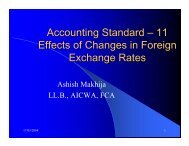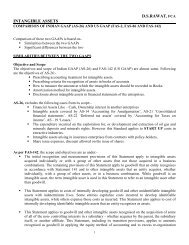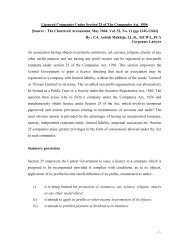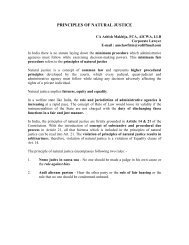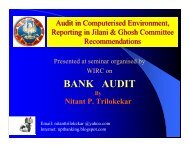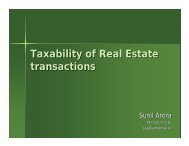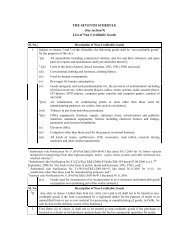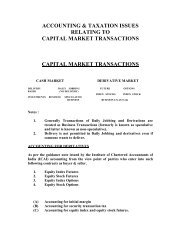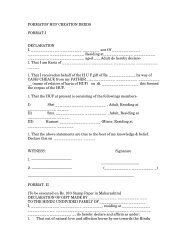2 July 2010,Friday Kapil Goel B.Com(H) FCA LLB Advocate Delhi ...
2 July 2010,Friday Kapil Goel B.Com(H) FCA LLB Advocate Delhi ...
2 July 2010,Friday Kapil Goel B.Com(H) FCA LLB Advocate Delhi ...
- No tags were found...
You also want an ePaper? Increase the reach of your titles
YUMPU automatically turns print PDFs into web optimized ePapers that Google loves.
ICAI <strong>Com</strong>mittee on International TaxationDate: 2 <strong>July</strong> <strong>2010</strong>,<strong>Friday</strong><strong>Kapil</strong> <strong>Goel</strong> B.<strong>Com</strong>(H) <strong>FCA</strong> <strong>LLB</strong><strong>Advocate</strong> <strong>Delhi</strong> High Court
Outline• Advance Rulings in E-Trade Mauritius 230 CTR 428 ; STARcases 229 CTR 7• Tax Avoidance concept (SC in Azadi Bachao; Vodafone cases263 ITR 706- latest applied P&H High Court Porrits and Spencer)• Bangalore Bench of ITAT ruling in Sun Microsystems 39 DTR69• Bangalore Bench of ITAT Ruling in Modilal Orient Ltd 37DTR 267• AAR in LS Cables (scope of advance ruling…)• <strong>Delhi</strong> Bench of ITAT on Service PE in Lucent case 120 TTJ929
Outline• Mumbai Bench of ITAT in Perroy A.G. 5 Taxmann.com 8(16/4/<strong>2010</strong>)- Royalty – India Swiss DTAA• <strong>Delhi</strong> High Court in Sahara case – Royalty – India CanadaDTAA 232 CTR 114• <strong>Delhi</strong> Bench of ITAT in Pioneer Overseas Corpn. India USADTAA 37 SOT 404• AAR in Seagate (India Singapore DTAA) PE Warehouse 230CTR 110• Mumbai Bench of ITAT in Valentine Maritime (IndiaMauritius DTAA) & J Roy Mc Dermott (Same DTAA)• Mumbai Bench of ITAT in Techmark Global (23/2/<strong>2010</strong>) IndiaUS DTAA
Outline• Bang Bench ITAT in CGI Information Systems ITA No.1376/Bang/08 & AAR in ABB Ltd ; E&Y – BHC in Krupp GmBH;Information Architects and Gujarat High Court in Scarlet Devices• <strong>Delhi</strong> Bench of ITAT in Maruti Udyog 130 TTJ 66 & AAR in HMSReal Estate 230 CTR 340• AAR in FICCI 230 CTR 126 (2); Real Resourcing 230 CTR 120;• <strong>Delhi</strong> Bench of ITAT in Parasrampuria Synthetics and Jaipur Vidyutcases• Mumbai Bench in Cartier Shipping; Airlines Roatables• Mumbai Bench in Hindalco (section 163)• AAR Dessault and Airport Authority of India• Karnataka High Court in Illions 231 CTR 449
Outline• Taxability of Offshore Supply Contracts Joint Stock<strong>Com</strong>pany Foreign Economic Association“Technopromexport” <strong>2010</strong>-TIOL-10-ARA-IT• Applicability of Circular 23 dated 23.7.1969 andCircular 786 dated 7.2.2000 after withdrawal videCircular 7 of October 22, 2009 - DDIT Vs. SiemensAtkiengesellschaft <strong>2010</strong> TIOL-102-ITAT-Mum• AAR Hyundai and Mistubishi AOP- Consortium concept
Tax Avoidance: SC AzadiBachao• Overall, countries need to take, and do take, a holistic view. The developing countries allowtreaty shopping to encourage capital and technology inflows, which developed countries arekeen to provide to them. The loss of tax revenues could be insignificant compared to the othernon-tax benefits to their economy. Many of them do not appear to be too concerned unless therevenue losses are significant compared to the other tax and non-tax benefits from the treaty,or the treaty shopping leads to other tax abuses.• There are many principles in fiscal economy which, though at first blush might appear to beevil, are tolerated in a developing economy, in the interest of long term development. Deficitfinancing, for example, is one; treaty shopping, in our view, is another. Despite the sound andfury of the respondents over the so called 'abuse' of 'treaty shopping', perhaps, it may havebeen intended at the time when Indo-Mauritius DTAC was entered into. Whether it shouldcontinue, and, if so, for how long, is a matter which is best left to the discretion of theexecutive as it is dependent upon several economic and political considerations. This Courtcannot judge the legality of treaty shopping merely because one section of thought considers itimproper. A holistic view has to be taken to adjudge what is perhaps regarded in contemporarythinking as a necessary evil in a developing economy.
Tax Avoidance: SC AzadiBachao• The basic assumption made in the judgment of Chinnappa Reddy,J. in McDowellthat the principle in Duke of Westminster has been departed from subsequently bythe House of Lords in England, with respect, is not correct• With respect, therefore, we are unable to agree with the view that Duke ofWestminster is dead, or that its ghost has been exorcised in England. The House ofLords does not seem to think so, and we agree, with respect. In our view, theprinciple in Duke of Westminster is very much alive and kicking in the country ofits birth. and as far as this country is concerned, the observations of Shah,J., in CITv. Raman are very much relevant even today.• It thus appears to us that not only is the principle in Duke of Westminster alive andkicking in England, but it also seems to have acquired judicial benediction of theConstitutional Bench in India, notwithstanding the temporary turbulence created inthe wake of McDowell
Tax Avoidance: SC AzadiBachao• We are unable to agree with the submission that an actwhich is otherwise valid in law can be treated as non-estmerely on the basis of some underlying motivesupposedly resulting in some economic detriment orprejudice to the national interests, as perceived by therespondents.
Tax Avoidance: E-Trade• E*Trade Mauritius Ltd. (“ETM”) is a wholly ownedsubsidiary of US based Converging Arrows Inc (“CAI”),which is in turn a wholly owned subsidiary of E*TradeFinancial Corporation (“ETFC”), also a US company.ETM was holding shares of an Indian company, IL&FSInvestmart (“IL&FS”). The transaction in question wasthe sale of the entire stake of ETM in IL&FS to HSBCViolet Investments (“ HSBC”), also based in Mauritius.
Tax Avoidance: E-Trade• ETM received the funds for this transaction from CAI, its parent company. Taking benefit ofthe capital gains tax benefit under the Treaty, ETM sought a certificate from the Indian taxauthorities (“Revenue”), authorizing payment of consideration by HSBC sans any withholdingtax.• Surprisingly, the Revenue refused to grant a nil withholding tax certificate. In this connectionETM filed a writ petition before the Bombay High Court, wherein the High Court withoutexamining the merits of the case directed ETM to file a revision application before theRevenue. After the Bombay High Court’s order ETM approached the AAR to determine theIndian tax implications of sale of an Indian company’s shares by a Mauritius company and theapplicability of Treaty benefits.• The Revenue claimed that though the legal ownership of the shares in IL&FS resides withETM, the real and beneficial owner of the capital gains is ETFC, and ETM is merely a facadedeveloped to avoid tax on capital gains in India. To support this contention, the Revenue alsostated that the transaction was funded indirectly by the ultimate parent company, ETFC. Lastbut not the least, the Revenue also argued that since the beneficial ownership of the IL&FSshares was with ETFC, the India-US Tax Treaty should be applied instead of the India-Mauritius Tax Treaty.
Tax Avoidance: E-Trade• The AAR reiterated the Supreme Court’s decision and stated that themotive of tax avoidance was not relevant so long as the same waswithin the framework of law. It held that ‘Treaty Shopping’ was notagainst law and the corporate veil cannot be lifted to deny treatybenefits.• The AAR also stated that since ETM was recognized as ashareholder of IL&FS and also received dividends in its capacity as ashareholder, merely because the transaction may have been indirectlyfunded by ETFC cannot lead to an inference that ETFC owned theshares in IL&FS. To take such a view would blur the mutualbusiness and economic relations between a holding and subsidiarycompany.
Tax Avoidance: E-Trade• An important point made by the AAR is also that a subsidiary has its own corporatepersonality and the fact that ETFC exercises acts of control over ETM does not in the absenceof compelling reasons dilute ETM’s separate legal identity.• Lastly, on the argument with respect to beneficial ownership, the AAR held that the concept of‘beneficial ownership’ which is used in the Treaty in connection with Interest and Dividendwas irrelevant in the context of taxability of Capital Gains. Again, relying on Azadi BachaoAndolan and Circular No. 789 3 and 682 4 of the Central Board of Direct Taxes (“CBDT”), itconcluded that a certificate of residence issued by the Mauritian authorities will constitutesufficient evidence for accepting the status of residence as well as beneficial ownership ofshares. Further the Revenue also alleged that ETFC had ownership rights over IL&FS, as somedirectors were found to be common between ETFC and IL&FS. However, the AAR observedthat the executive control over IL&FS was never exercised by the common directors andETM’s status as a shareholder of IL&FS is not in any way affected by the overall controlexercised by the US parent company.
Tax Avoidance: E-Trade• Bombay High Court in IAL Shipping Agencies : In context ofseparate-legal entity approach, BHC has observed that: "It cannot besaid that the assessee company and the UK company, which wereunder the same management, are the same entity. Both of them areseparate companies incorporated under the respective statutes oftheir countries and merely because the shareholding is held by thesame group, the companies do not loose their separate entitles andthe conclusion of the assessing officer that they cannot act asprincipals and agents is bad in law especially when it is not indispute that the assessee companies were incorporated in Indiawhereas the said IAL Container Lines (UK) Ltd. was incorporatedunder the provisions of the <strong>Com</strong>panies Act prevailing in UK. The UKcompany was already carrying out its activities of shipping businessin India prior to the incorporation of the assessee "" …..
Tax Avoidance: E-Trade• Supreme Court decision in the case of Mrs Bacha FGuzdar (27 ITR 1), which held that the company is a legalentity, separate and distinct from its shareholders andthere is nothing in the Indian law to warrant theassumption that a shareholder who buys shares buys anyinterest in the property of the company
Tax Avoidance: STAR AAR…..Be that as it may, the premise on the basis of which theRevenue has built up its argument that amalgamation isjust a colourable device or subterfuge to avoid the taxliability on account of capital gains and there is no otherbusiness purpose or expediency behind the purportedamalgamation, is not, in our view, sound andacceptable…..
Tax Avoidance: STAR AARHELD: …. It is in the light of this legal position expounded by theSupreme Court and the High Courts on the subject of tax avoidancethat the approach to the interpretation of the words in clause (iii) ofthe proviso to Section 245 R(2) has to be channelled. Theexpression “transaction designed to avoid income tax” cannot beunderstood to mean that in the course of entering into atransaction, the tax payer is precluded from taking into accountthe tax implications involved and to minimize its tax burden. It iswithin the legitimate freedom of the contracting parties to enterinto a transaction, which has the effect of extending to the partythe benefit of exemption under the taxation statute. Thecontracting party is not bound to enter into a transaction in sucha way that it results in tax liability while foregoing the benefit ofexemption under law…
Tax Avoidance: P&H Porrits..• On Subject of Judicial Discipline: Accordingly, we take it as well settledthat if a smaller Bench has lateron explained the judgment of a larger Benchof Hon’ble the Supreme Court then the later is binding. Examined in theaforesaid perspective, the view expressed by Hon’ble the Supreme Court inthe case of• Azadi Bachao Andolan (supra), has to be accepted as binding. Therefore,it cannot be said that the principle of law laid down by the House of Lordsin Duke of Westminster’s case (supra), as followed, explained and appliedin the case of Azadi Bachao Andolan (supra), is no longer applicable. Theprinciple is found applicable in its native country and cannot be deemed tohave been abandoned. Moreover, no such principles having been laid downin the case of McDowell & Co. Ltd. (supra) by the majority judgment, itis not possible to accept the argument advanced by the revenuerespondent...It is well settled that if a smaller Bench of Hon’ble theSupreme Court has lateron explained its earlier larger Bench then the laterjudgment is binding on the High Court..
Tax Avoidance: P&H Porrits..• …. On Tax Avoidance and Motive etc: ..The aforesaid discussionwould show that once the transactionis genuine merely because it hasbeen entered into with a motive to avoid tax, it would not become acolourable devise and consequently earn any disqualification... It hasready support from the Division Bench judgment of this Courtrendered in the case of Satya Nand Munjal (supra) and theDivision Bench judgment of Orissa High Court in the case ofIndustrial Development Corporation of Orissa Ltd. (supra) andvarious other judgments of <strong>Delhi</strong> and Madras High Courts(supra). (<strong>Com</strong>missioner of Income Tax v. Hindustan Tin WorksLtd., (2009) 226 CTR (Del) 42 and <strong>Com</strong>missioner of Income Taxv. Vikram Aditya and Associates P. Ltd., [2006] 287 ITR 268 andalso a Division Bench judgment of Madras High Court in the case of<strong>Com</strong>missioner of Income Tax v. Lakshmi Mills Co. Ltd., [2007]290 ITR 663..)
Tax Avoidance: VodafonecaseIst Round : BHC ruling at 311 ITR 46 …SC ruling at 221CTR 617IInd Round: BHC matter coming WRIT PETITION (L)NO.1308 OF <strong>2010</strong> Final hearing on 8 <strong>July</strong> <strong>2010</strong>
Tax Avoidance: VodafonecaseHTIL HongkongVNV NetherlandsShares were purchasedof CGP100% IN CGP INVESTCAYMAN ISLANDoverseasWrit In BHCIndian RevenueIssued SCNMauritius – IHC 100% by CGPIndia 67% holding in HEL
Tax Avoidance: Vodafone• Facts:• HTIL Sold the shares of CGP Investments Cayman Islands toNV Netherlands• Effectively, HTIL sold controlling stake of Indian companiesthrough indirectly selling shares of Indian <strong>Com</strong>panies• The transactions was concluded outside India and paymentwas also made outside India• NV Netherlands did not withhold any taxes from paymentsmade to HTIL as the transaction was executed outside India inrelations of shares of overseas company
Tax Avoidance: Vodafone• Issue: Whether NV Netherlands defaulted in not withholdingtax from payments made to HTIL
Tax Avoidance: Vodafone BHCInitial order observations• Subject matter of transaction between Vodafone and HTIL is transfer of interests,tangible and intangible in Indian companies of Hutch Group in favour of Vodafone andnot an innocuous acquisition of shares of CGP• Prima facie, HTIL has earned income liable for capital gains tax in India as the incomewas earned towards sole consideration of transfer of its business / economic interest as aGroup, in favour of Vodafone• Under the share transfer agreement, FIPB approval was mandatory and Vodafonereserved the right to cancel agreement if FIPB does not grant approval• Under FIPB approval, Vodafone bound to comply with all Indian laws including IndianIncome-tax Act• Although shares may be an asset, they also may be merely a mode or vehicle used totransfer some other asset(s) (as in the present case)• Vodafone becomes a successor in interest in the JV between HTIL and Essar Group andalso becomes a co-licensee with the Essar Group to operate mobile telephony in India
Tax Avoidance: Vodafone BHCInitial order observations• Purpose of transaction was:• To enable Vodafone to acquire controlling interest in HEL by acquiring direct andindirect equity and loan interest• To acquire the right to manage HEL by appointing its own directors on the board• To enable Vodafone to successfully pierce the Indian mobile market to enlarge globalpresence• Controlling interest must necessarily be preceded by extinguishment of right, title andinterest in the shares of the Indian group• Divestment in interest of enormous value in shares by HTIL would result in enduringbenefit and acquisition of a capital asset in India by Vodafone, resulting in capital gainsin the hands of HTIL chargeable to tax in India• On question of extra-territorial jurisdiction, Reference to ‘Effects Doctrine” in US – anystate may impose liabilities, even upon persons not within its allegience, for conductoutside its borders that has consequences within its borders which the state represents• Having admitted that HTIL has transferred 67% interest in HEL qua shareholders, FIPB,statutory authorities in USA/ Hong Kong, neither Vodafone not HTIL can take a differentstand before Indian tax authorities
Tax Avoidance: Vodafone BHCInitial order observations• Vodafone has not submitted primary / original agreement, subsequent documents /agreements with HTIL; constitutional validity of the income tax provisions cannot begone into• Question on taxability can be gone into only by concerned authorities and cannot bedetermined on the basis of affidavits / counter affidavits in writ proceeding.• Vodafone has not been able to demonstrate that show cause notice is totally non-est inlaw for absolute want of jurisdiction of the authority to even investigate into the facts, byissuing a show cause notice• The case involves investigation into voluminous facts on the basis of which the questionof chargeability to tax and the question of duty to deduct tax can be determined• Rights of Vodafone are fully safeguarded u/s 195(2), 195(3) and 197 of ITA• Show cause notice cannot be termed extraneous/ irrelevant / erroneous/not based on anymaterial at all
Tax Avoidance: Developmentsto look For:• Impact of SC ruling in Eli Lily & Co (if any) 312 ITR 225on Extra territorial operation• Position in case of transfer of Minority stake (intrenches)? Position in case of Participatory Notes?• SC awaited ruling in Wallfort (Dividend Stripping case)(underlying BHC ruling at 310 ITR 421 & ITAT SpecialBench (in favor of assessee))
Tax Avoidance: Developmentsto look For:• Section 112 & Section 114 & Section 161 of Direct TaxCode Bill 2009 (latest revised discussion paper <strong>2010</strong>)• Protocol in India- UAE DTAA and India Singapore DTAAon Tax Avoidance etc
Bang ITAT – SunMicrosystems• India Singapore DTAA – Article 7 & Article 12 – FTS –• Logistic Services do no make available any technology• There is no evidence on record to show that serviceprovider company made available any technology• Revenue has not examined any employee of servicerecipient Indian Co to show that it could have utilized theexperience gained by itself…• Rulings referred: BHC in Diamond Services 216 CTR120; AAR in Intertek 307 ITR 418, Raymond 86 ITD 791
Changes in DTC in FTS andServices taxation• Additional entries?• Software Taxation• Technical Design etc• Transportation Services added as new entry in deemedcategory of present section 9(1)….
Bang ITAT Mondial Orient• Indian Branch officer of assessee a hongkong basedcompany undertaking the activities of identification ofsuppliers, quality control, pre-production meeting, onlineinspection, handling of logistic under an agreement withanother hongkong based co MSL for providing assistanceto its customers in connection with purchase of goodsfrom India…..Held covered by Expl-1 clause b to section9(1)• Changes in DTC on Business Connection definition ….
Bang ITAT Mondial Orient• AAR Conclusion in Aramco Overseas 230 CTR 209…adverse conclusion to ITAT ruling..• Impact of Withdrawal of CBDT Circular No 786 of 2000(refer AAR in Spahi – commission not FTS and SC in 39ITR 775; SC 106 ITR 11 & 5 ITR 216 Cal HC..etc)• Impact of CBDT Circular No 23 of 1969withdrawal…(import of goods etc)
AAR in LS Cables• The question arising from the application is related tocontract with DTL which is not pending before anyIncome Tax Authority Tribunal or court. The questionbefore the High Court was confined to the aspect ofwhether the contract with PGCL was a composite contractand that the question before AAR was wide in its scope…• In other words, application would be maintainable unlessthe question relates the specific transaction for whichapplication has been made before AAR….
<strong>Delhi</strong> ITAT Lucent ServicePEHeld: A perusal of article 5(2)(1) clearly shows that it is not only theemployees through whom if services are provided the PE is to set tocome into existence. It also includes other personnel. Obviously, theterm other personnel has to be read with reference to the earlier wordsas provided in the said article 5(2)(1). The other personnel specifiedhere would be persons over whom the enterprise would be having acontrol. In the present case undisputedly employees of the affiliates ofthe assessee had been employed through LTIL the services ofinstallation, commissioning, testing and bringing up to operation of thehardware and the software sold by the assessee to Escotel through itscontract in regard to GSM project to be completed on a turnkey basis.……<strong>Delhi</strong> ITAT Lucent Technologies International Inc Vs. Deputy<strong>Com</strong>missioner of Income Tax, New <strong>Delhi</strong>
<strong>Delhi</strong> ITAT Lucent caseHeld:……These employees of the affiliates over whom the assesseeas a control would fall within the term “other personnel” andconsequently, it would have to be held that a PE did exist as per theinclusive term as provided in article 5(2)(1) of the DTAA betweenUSA and India. A copy of the returns of the expatriates which havebeen placed in the paper book also clearly show that they have beenin India for more than 90 days within the 12 month period fromApril, 1996 to March, 1997. Consequently, the terms of article5(2)(1)(i) of the DTAA between USA and India are fulfilled.Consequently, it would have to be held that LTIL in fact was aservice PE of the assessee . ……<strong>Delhi</strong> ITAT Lucent TechnologiesInternational Inc Vs. Deputy <strong>Com</strong>missioner of Income Tax, New<strong>Delhi</strong> DHC on assessee’s appeal has admitted question of law inITA 760/2009
BHC in Krupp GmbH• The learned Counsel appearing on behalf of the Revenuehas stated that the first and second question relate to thesame issue namely whether reimbursement of expenseswould be liable to be included in the income and hencethey are taken up together Held• In so far as the issue of reimbursement is concerned, theTribunal held that though there was a conflict between thejudgment of the Kerala High Court, which was relied uponby the <strong>Com</strong>missioner of Income Tax (Appeals) and thejudgment of the Calcutta High Court in the case of CITV/s. Dunlop Rubber <strong>Com</strong>pany Limited….
BHC in Krupp GmbH• It would follow a view which was favourable to theassessee, consistent with the judgment in VegetableProducts Limited The question as to whether areimbursement for expenses would form part of the taxableincome is not resintegra in so far as this Court is concerned.In <strong>Com</strong>missioner of Income Tax V/s. SiemensAktiongesellschaft5, a Division Bench of this Court heldthat it was in agreement with the view taken by the CalcuttaHigh Court in Dunlop Rubber <strong>Com</strong>pany Limited (supra)and by the <strong>Delhi</strong> High Court in <strong>Com</strong>missioner of IncomeTax V/s. Industrial Engineering Products (Private) Limited.
BHC in Krupp GmbH• Further refer:a) <strong>Delhi</strong> Bench ITAT in Grand Prix (in context of section194C reimbursements to CHA etc) 34 DTR 248 &Expeditors International 118 TTJ 652b) BHC in Information Architechtsc) DHC in Fortis & Lear Automotivesd) Gujarat High Court in SCARLET DESIGNS PVT LTDe) Bang Bench in International Airport Ltd 116 ITD 446
Bang ITAT in CGI Info..6.2 Based on the above observations, Hon'ble ITAT,Bangalore Bench, concluded that the agreement clearlyprovides that payments are to be made to reimburse thecost incurred by CGI Group of Canada for development ofits software, which may be utilized by the members of theGroup worldwide and that such services are known asintranet services. CGI Group is the absolute owner of thefacility and also holds the Intellectual Property Rights andno license is transferred to the assessee in India. Reliancewas placed on the decision of the Hon'ble Tribunal, <strong>Delhi</strong>Bench in the case of ACIT vs Modicon Network (P) Ltd.(14 SOT 204)…
Bang ITAT in CGI Info….….wherein it was held that reimbursement of expenses had no elementof income and therefore cannot be considered as fees for technicalservices. Hence, there was no liability to deduct tax u/s 195(1) of the Act…. In the present case, on a perusal of the agreement of cost sharing, wehave already noticed that the payments were made by the assessee forreimbursement of the expenses incurred by CGI Canada. It has beenclearly mentioned in the agreement that the cost incurred does notinclude any mark up for income and that is limited to the actual cost. Nomaterial was brought on record by revenue that the cost reimbursed bythe assessee includes element of income. Therefore, the decision of the<strong>Delhi</strong> Tribunal in the case of Modicon Network (supra) squarely appliesin the present case ".
Mumbai ITAT Tekmark GlobalSolutions LLC• Indo-US Treaty : Persons deputed by an American<strong>Com</strong>pany to an Indian company cannot be considered asits PE in India when services rendered by them areindependent and not under control of that Americancompany• No income would arise to the American company in Indiain the course of deputing personnel to an Indian companywho work under the control and supervision of the Indiancompany and carry out the work allotted to them by theIndian <strong>Com</strong>pany and the American company isreimbursed by the Indian company
Nathpa Jhakri Joint Venture vsACIT Mumbai ITAT 37 SOT1605. Now we turn to consider as to whether thereimbursement of expenses by the Indian assessee to thenon-resident is taxable in the hands of the payee or not. Anamount is chargeable to tax if it is pure income or containssome component of income in it. It is axiomatic that tax ischarged on income and not on receipts. When a particularamount of expenditure is incurred and that sum isreimbursed as such, that cannot be considered as havingany part of it in the nature of income. Recently the SpecialBench of the Tribunal in Mahindra and Mahindra Ltd. v.Dy. CIT[2009] 30 SOT 374 (Mum.) considered similarissue
Nathpa Jhakri Joint Venture vsACIT Mumbai ITAT 37 SOT160……and came to the conclusion that the payment towardsreimbursement of expenses is not in the nature of incomeand resultantly there was no obligation to deduct tax atsource under section 195. As admittedly the amount indispute is reimbursement of expenses, the ratio of theSpecial Bench order in Mahindra and Mahindra. Ltd. scase(supra) will apply and resultantly the amount will not betaxable in the hands of the non-resident. In that view of thematter, since there is no element of income in thereimbursement of expenses in the hands of payee, it willnot attract taxation.
BHC in InformationArchitects• In Information Architects: Alleged Non TDS on reimbursements andDisallowance u/s 40(a)(iii)"17. In so far as the second issue is concerned, it relates to theamounts paid by the assessee to its employees towards overseasmaintenance allowance. These amounts were paid towards expensesat the rate of IEP 50 per day per employee. The Tribunal hascorrectly held that these amounts constitute only reimbursement forthe expenses incurred by the employees at a particular amount perday and would not form part of the salary in the hands of therecipients. Hence the question of applying sub clause (iii) ofsubsection (a) of Section 40 would not arise. The view of theTribunal is correct and would not raise any substantial question oflaw."
Mumbai ITAT Royalty Perroy• Indo-Swiss Tax Treaty – Consideration forinformation concerning industrial, commercial andscientific experience is to be regarded as royalty, onlyif it is received from imparting know-how• Providing strategic consulting services, which may entailthe use of technical skills and commercial experience by astrategic consultant, does not amount to know-how beingimparted to the buyer of the strategic consulting services.
Contd Mum ITAT Royalty….25. It is clear from the above commentaries that consideration forinformation concerning industrial, commercial and scientificexperience is to be regarded as royalty, only if it is received fromimparting knowhow. However, providing strategic consultingservices, which may entail the use of technical skills and commercialexperience by a strategic consultant, does not amount to know-howbeing imparted to the buyer of the strategic consulting services.26. We have already seen the nature of services rendered by theAssessee. The Assessee was only rendering consultancy services.The Assessee did not impart any know-how to STPL. The assesseeretained the experience required to perform the services. Thereforethe receipts in question cannot be said to be in the in the nature ofroyalty.
DHC Sahara Royalty• Facts: The respondent/ assessee had entered into an agreement, as aforesaid,on 10.07.1996 with IMG. As per clause 2(a) of the said agreement, IMGwas to provide to the assessee “the benefits” for the tournaments, subject toICC regulations, in connection with the protected categories. The expression“benefits” has been defined in Clause 1(i) of the said agreement to mean thetitle sponsorship benefits in connection with the tournament set out in theSchedule. The word “tournament”, in turn, was defined in Clause 1(vi) tomean, inter alia, the Friendship Cup, to be known as “the Sahara Cup”,which would consist of a series of five one day international cricket matchesto be played in Canada between the full Indian and Pakistan national cricketteams, as selected by the cricket authorities of their respective countries.The matches were to be recognized by the ICC as having full one dayinternational cricket status …
DHC Royalty Sahara…• Appellant/ Revenue’s Contention: The revenue insists that the payment made by therespondent/ assessee to IMG Canada for the said rights of title sponsorship amounted to aroyalty payment under Article 13 (3) of the said DTAA … Held:• “We have also examined the terms of the agreement between the respondent/ assesseeand IMG Canada. It is clear that what has been paid for by the respondent / assessee is theright of title sponsorship and the benefits connected therewith, which have been set out inthe Schedule to the said agreement and to which we have already referred to above ….What the <strong>Com</strong>missioner of Income Tax (Appeals) failed to note was that there was notransfer of a copyright or the right to use the copyright flowing from IMG Canada to therespondent / assessee and, therefore, any payment made by the respondent/ assessee toIMG Canada would not fall within Article 13(3)(c) of the said DTAA. The reference inArticle 13(3)(c) is to “any copyright” and it is not a reference to “any right”. 9. In thesecircumstances, we feel that the findings of fact and law and the conclusions arrived at bythe Tribunal are correct”
<strong>Delhi</strong> ITAT Maruti Udyog IndiaFrance DTAA FTS11.4 From plain reading of above letter one may find that theimpact test to be conducted by UTAC were purely technical innature. After carrying out the impact tests in above manner testingreports were submitted to assessee which were utilised for thepurposes of modification of the products. This in our consideredopinion will amount to rendering of technical services/ informationin form of impact testing reports by UTAC France to the assessee.Accordingly, the amounts paid by the assessee to UTAC would be innature of technical or consultancy services. (wide FTS Clause- MFNthere)refer latest Mumbai ITAT ruling in Bureau Veritas 131 TTJ 29 onIndia France DTAA- MFN applied
Mum ITAT Ashapura BauxiteTesting India China DTAA• The assessee, an Indian company, entered into an agreement with aChinese company for bauxite testing services in its laboratories(outside India) and for preparation of test reports. The assessee filedan application u/s 195(1) in which it argued that as the services wererendered outside India and the recipient did not have a permanentestablishment in India, the payments were not chargeable to taxunder the India-China DTAA and no tax was required to be withheldat source. The AO took the view that the payments constituted “feesfor technical services” u/s 9(1)(vii) and Article 12 of the DTAA andtax was required to be withheld at 10%. This was upheld by the CIT(A). The assessee appealed to the Tribunal. HELD appealDISMISSED
AAR Real Resourcing caseHeld "Catering to the function of referring the potential Indian candidates to theIndian based recruitment company without creating any commitment to recruitthem does not, without anything more, give rise to an inference of PE. For renderingsuch services, a fixed place of business in India or dependent agent need not necessarilybe there. The applicant has clarified that it has really no office or business place in New<strong>Delhi</strong> and that the address in New <strong>Delhi</strong> is basically a ‘virtual office’. Evidently, it meansthat the address and phone number is given so as to serve as a contact point and for someroutine work of inconsequential nature. However, as and when the applicant startsextending its referral services to India, the factual position will be notified to the<strong>Com</strong>missioner herein so that inquiries could be made as to the role if any played bythe so-called office in India. At the same time, the Department is bound by the legalposition clarified herein and in Cushman and Wakefield. Subject to thisobservation, we are of the view that the receipts in the nature of referral fee fromthe Indian based recruitment company cannot be subjected to tax as business profitsin view of the provisions of the Treaty.“ INDIA UK DTAA
AAR FICCI – INDIA USDTAA• Held " 10. As regards the entrepreneurial workshop which is an additional feature in thepresent case and in respect of which certain doubts have been entertained by us initially,we are unable to reach a different conclusion after going through the relevant materialplaced before us. Having regard to the short duration of the course, the contents andpattern of the modules presented, it is difficult to infer that any technical knowledge,experience, or skills were shared with and made available to the participant – innovators,much less it can be said that there was a transfer of technical know-how/knowledge. Thecontents of the modules and topics presented in the course of the workshop were sourcedby and large from University’s course of study for post-graduation in technology. Thereis nothing like sharing the trade secrets or imparting skills in a practical manner. Nodoubt, the workshop an enlightening exercise, opening up new vistas of thinking. Theparticipants will benefit by the lectures and deliverables and they may be better motivatedor equipped to deal with the problems in the field of commercialization/marketing of thetechnology. But, on that account, it cannot be said that the definition of FTS as explainedearlier has been satisfied in the instant case. Orientation towards business and inculcationof entrepreneurial outlook does not really amount to "making available" the technicalknowledge, experience or skills of the experts of IC
<strong>Delhi</strong> ITAT SNC Lalvalin• India Canada DTAA• The second limb in clause (b) of sub article (4) of Article 12 ofDTAA can be invoked when the amount is paid in consideration forrendering of any technical or consultancy services and if suchservices consists of the development and transfer of a technical planor a technical design also. the condition of making availabletechnical knowledge is not sin qua non for considering the questionas to whether the amount is fees for included services or notparticularly when the payment is only where the technical orconsultancy services consists of development and transfer of atechnical plan or technical design only. This will be considered as"fees for included services" within the meaning of Article 12 (4) ofthe Act and hence, in terms of Article 12(2), tax rate should becharged.
AAR in HMS Real Estate• HMS real Estate case: India US Treaty• It is significant to note that the latter part of clause (b) of para 4 speaks of“development and transfer of a technical plan or technical design. This limbof clause (b) is squarely attracted to the present case because technicalservices rendered by HOK resulted in the development and transfer oftechnical plan and design to the applicant. If an out-right transfer of a designor plan for consideration has to be treated as an independent transactionunrelated to the services, the scope of latter part of clause (b) will beconsiderably diluted and the very purpose for which the said words wereincluded in the definition of FTS will be defeated. In one sense, there coulda transfer of designs and in another sense the development and transfer oftechnical plan/design can be viewed as a sequel to and integral part of theservices undertaken by HOK. In the present case, clause (b) of para 4 isattracted having regard to the true nature and purport of the Agreement. …
HMS Real Estate AAR…..The architectural services rendered by HOK can also be broughtwithin the fold of the first part of clause (b) starting with theexpression “make available”. 8. We are, therefore, of the view thatbasic(design) services which include preparation of Master Plan,concept design, schematic design, design development andconstruction documents, assistance in bidding and contractors’selection process and consultancy during construction phase are allpart of architectural services undertaken by HOK as per theAgreement and the payment received by HOK for furnishing all thesedocuments and services to the applicant fall appropriately within themeaning of ‘fees for included services’ under Article 12.4(b) of theIndia-US Treaty…On the facts presented by the applicant, we musthold that the receipts by HOK on account of consultancy fee payableto consultants in USA on actual basis will not give rise to taxableincome in India.
AAR in Airport Authority case• Though in the 3rd ruling (304 ITR), certain reasons are given, it appears that the line ofreasoning adopted by AAR in that case is apparently at variance with the latest ruling inDassault Systems. In Dassault Systems (AAR No 821/2009)2 case, we have exhaustivelyconsidered various aspects of copyright in the context of royalty definition in the I.T.Actand Treaty. However, it must be pointed out that in Dassault Systems, the nature ofsoftware was different. It was standardized software of special purpose which had theintrinsic potential to generate the output without any further steps being taken before itis put to use, whereas in the present case, the software of the automation system doesnot by itself give rise to an output which can directly be put to use. The applicant hasstated that the software is customized in the sense that it requires site specificmodifications/adaptations, which are done at the spot. However, this point ofdistinction alone would not help us to distinguish the ruling in AAI’s case and inDassault Systems. Suffice it to state that some of the points and legal aspectshighlighted in Dassault Systems have missed the attention of this Authority and to theextent it goes against the principles laid down in the latest ruling in Dassault case, it isnot safe to decide the matter on a mere reiteration of the view taken in the 3rd AirportAuthority case….
AAR Software: Airport Athoritycase..• The crucial question is: What is the real nature andsubstance of the contract with which we are concerned?Can it be considered to be primarily a contract for thesupply of customized software or is it a contract that fallswithin the scope and sweep of royalty and includedservices dealt with under Art.12 of the India-US Treaty ?Section 9(1)(vi) & (vii) of the Income Tax Actcorresponds to Art.12 of the Treaty
AAR Software : AirportAuthority caseWe are of the view that the receipts under the contract attributable to software andinstallation and other services are definitely covered by cl.(b) of para 4. we are of theview that the said payments fall within the purview of Art.12 and therefore we reaffirmthe conclusion reached by this Authority, though for different reasons. First, it must benoted that the contract is for automation upgrade of the existing automation system of the3rd runway, <strong>Delhi</strong>. “Automation system” means the software system delivered to the AAIunder the contract. Raytheon grants the AAI a “licence on non-transferable, nonexclusive,royalty-free basis to use the executable software code and technicaldocumentation for use in the automation system at <strong>Delhi</strong>”………… The software of theautomation system is the mechanism through which the informations and inputsconcerning various technical aspects based on the expertise and experience of Raytheonare made available to the AAI personnel which in turn equips them with the necessarytechnical skills and operational efficiency. By means of various technical servicesprovided by Raytheon’s personnel and the sharing of their technical knowledge andexperiences with AAI personnel at the time of integration with the existing system andthe site acceptance test and the technical manuals and data furnished for putting thesystem to effective use, Raytheon is making available to AAI its technical knowledge andskills. In ultimate analysis, the recipient of service is enabled to apply the technology. …
AIRPORT AUTHORITY AAR….Viewed from another angle, the transfer of a technical plan is alsoinvolved in devising and activating the upgraded automationsystem….The fact that the applicant – AAI itself has not beenprovided with the technology for developing the software as suchdoes not really make a difference. The expression used is: “makeavailable technical knowledge, experience or skills”. The substanceof the transaction, in our view, is rendering of technical andconsultancy services which make available to AAI the technicalknowledge, experience and skills possessed by Raytheon in the fieldand the provision of software system is only part of that exercise.The delivery of software and the specification of the cost of softwarecannot be viewed in isolation. Viewed in this background, we are ofthe view that the payment made towards software can be legitimatelybrought within the fold of Art.12(4)(b) of the Tax Treaty, if notArt.12(3).
AAR Seagate: India SingaporeDTAA• Applicant/ Petitioner/ It is engaged in the business ofmanufacture and sale of Hard Disk Drives. It has beensupplying Disks to Original Equipment Manufacturers(OEMs) in India. The applicant states that in order tominimize the delays in the procurement of inputs (sic fromthe applicant), the OEM has proposed to put in place aVendor Managed Inventory (VMI) model. Under the VMImodel, the applicant would enter into agreements with‘Independent Service Providers’ (ISPs) in India whowould stock disks in India on behalf of the applicant anddeliver the same to the OEM on a ‘Just-in Time’ basis ...
AAR Seagate: India SingaporeDTAA• It is the contention of the applicant that it does not have afixed place PE or agency PE within the meaning of Art.5of DTAA and therefore the business profits derived by iton account of supplies of goods to the customers in Indiathrough the media of ISPs or YCH are not liable to betaxed in India. The Department in its comments takes thestand that the applicant has a PE in India and that thewarehouse of the ISPs or YCH shall be treated as PE. Inthe alternative it is submitted that an agency PE exists.These contentions were reiterated by the departmentalrepresentative in the course of hearing.
AAR Seagate: India SingaporeDTAA• 6.1. The applicant contends that it has no premises or facilities orinstallations owned, leased or kept at its disposal in India nor does it haveany other kind of physical presence in India. It only has its goods stored inIndia in a warehouse owned and operated by Independent Service Providersand the applicant has only a restricted right of entry into the warehouse forthe purpose of inspecting the goods during business hours. We find itdifficult to accept this contention. It seems to us that the applicant does havea fixed place of business which is the focal point of its business operationsin India. The fact that the fixed place of business is owned or possessed bythe logistics service provider does not detract from the position that theapplicant has a distinct, earmarked and identified place which caters to itsbusiness. In one sense, it is the business place of warehouse/service providerand in another sense, it is also the fixed place of business of the applicantfrom where the sales activities are carried on. Both the applicant and thewarehouse/service provider act in cohesion to ensure the product delivery tothe customers promptly. ……
AAR Seagate: India SingaporeDTAA• ….By merely outsourcing the operations leading to supplies ofproducts, it cannot be said that the applicant does not carry on anybusiness in India from a fixed place. The ground realities cannot bedisregarded. The question whether the person carrying on businessoperations on behalf of or pursuant to the instructions of theapplicant is a dependent or independent agent is not very material inconsidering the applicability of Art.5.1. The business of the applicantat a fixed place is being carried on through the media of thewarehouse provider who can also be characterized as serviceprovider. Having regard to these facts and features, we have toaccept the contention of the Revenue that the demarcated space inthe warehouse of ISP constitutes the fixed place of business withinthe meaning of Art.5.1 of DTAA.
<strong>Delhi</strong> ITAT ParasrampuriaSynthetics (20 SOT)• Assessment year 1999-2000 - Whether rendering services by using technical knowledgeor skill is different than charging fees for technical services inasmuch as in latter casetechnical services are made available due to which assessee acquires certain right whichcan be further used - Held, yes - Assessee made certain payment to a contractor in respectof inspection and maintenance support agreement, fabrication of chilled water line, workorder for thermal insulation/erection, conversion of Partially Oriented Yarn (POY) intopolyester textured yarn and twisted yarn - Whether such payment could not be treated as‘fees for technical services’ as technology or technical knowledge of persons were notmade available to assessee, but only by using such technical knowledge, services wererendered to assessee - Held, yes - Whether therefore assessee would not be liable todeduct tax at source as per provisions of section 194J, on such payments - Held, yes - Dy.CIT v.Parasrampuria Synthetics Ltd. (<strong>Delhi</strong>)• Applied in Jaipur Vidyut case Held Operation and Maintenance Services held do notamount to FTS u/s 9(1)(vii) as they do no make available scientific knowledge, skill etcand hence no TDS required to be deducted thereon u/s 194J (ALSO REFER DELHIITAT IN LUFTHANSA CASE: REPAIRS AND MAINTANENCE)
Mumbai ITAT Star Cruise• Income of a non-resident shipping company can not be charged totax in India unless either passengers, who have booked cruisepackage, are traveling from or to any port in India• Merely because assessee is doing booking of different cruise tourpackages for a foreign company, that cannot per se be decisive forholding that said foreign company is having “business connection” inIndia within the meaning of section9(1)(i)• ITA No. 6499/Mum/2006 (Also see DHC in UAE Exchange centre)
AAR IN Royal Bank ofCanada• There is yet another angle from which the issue can be viewed. Irrespectiveof the provisions of the domestic law i.e. IT Act, the applicant can also seekthe benefit of the treaty provisions. If the income derived by the applicantcan be characterized as business income rather than the capital gain, suchincome cannot be taxed in India in the absence of permanent establishment.If, on the other hand, the income is in the nature of capital gains, the same isliable to be taxed under the IT Act. Thus the classification of income for thepurpose of treaty is necessary. Such classification has to be done inaccordance with the ordinary and well settled principles. A special provisionin the Income-tax Act cannot be pressed into service to deny the benefitwhich is otherwise due to FII under the tax treaty provisionsnotwithstanding their conflict with the domestic law of income tax. Viewedfrom this perspective, we come back to the issue of characterization ofincome irrespective of section 115AD. The Revenue’s argument is liable tobe rejected for this additional reason also.
AAR Royal Bank of Canada14.We are therefore of the view that the first question has tobe answered in the affirmative. The third question in so faras it is related to question no. (1) is also answered in theaffirmative. That means, the business income of theapplicant arising from the ‘derivative transactions’ is notliable to be taxed in India by virtue of article 7(1) of theDTAA between India and Canada.
Kar High Court Illions case• Kar High Court Section 195: Non resident Payee:Imparting Education by USA based institution through theassessee in India did not amount toBUSINESS/COMMERCE and the USA co having no PEin India, assessee is not liable to TDS u/s 195 whileremitting Payment to USA• Indian presence (respondent –ILLions) acted asfacilitation and coordination centre in India – held noBC/PE
[<strong>2010</strong>] 3 taxmann.com 10(AAR - New <strong>Delhi</strong>)“Technopromexport”,• On the facts and circumstances of the case, whether the amountsreceived/receivable by Joint Stock <strong>Com</strong>pany Foreign EconomicAssociation “Technopromexport” (‘Applicant’ or ‘JSCTechnopromexport’) from National Thermal Power CorporationLimited (‘NTPC’) under Contract No. CS-9558-102-2-FC-COA-4520 dated 25 March 2005 (‘Offshore supply contract no. 4520’), forOffshore supply of all plant and equipment including mandatoryspares are liable to tax in India under the provisions of the IncometaxAct, 1961 (Act) and the 2.Agreement for Avoidance of DoubleTaxation between India and Russia (‘India-Russia tax treaty’)?
“Technopromexport”HELD11. In view of our above analysis, perusal of documentsand case laws, we find that no portion of consideration isreceived by the applicant in India. Further, no incomeaccrues or arises in India to the applicant as all thetransactions took place outside India. The materials wereshipped outside India , the title and property passedoutside India (on high seas) and the payment was receivedoutside India and therefore the applicant is not liable topay income-tax in India (Madras High Court in Ansaldodistinguished; AAR in Huosung applied and SC in IHI288 ITR)
“Technopromexport”HELD• Thus, the decision in the case of Ishikawajma was distinguished bythe learned judges of Madras High Court. It is of course debatablewhether the points of distinctions made out are correct. But, the factsituation in the present case is quite different. Firstly, at the initialstage itself, the bids were invited by NTPC for three separate worksviz. offshore supply, onshore supply and onshore services. Threeseparate contracts were executed. There is no basis to think nor isthere any allegation that the contracts were split up at the instance ofthe applicant or that there was price imbalance. In any case, we findno distinguishing feature that makes the Ishikawajma caseinapplicable to the facts of the present case, as discussed earlier andthis Authority is bound by that decision (supplement by JusticeReddi)
“Technopromexport”HELD• As observed earlier, even if the PE was involved incarrying on some incidental activities such as clearancefrom the port and transportation, it cannot be said that thePE in connection with the offshore supplies could beinferred. With this supplement, I concur with theconclusion of the learned Member that the question has tobe answered in the negative (supplement by Justice Reddi)
Mumbai ITAT Siemens• For off-shore supply contract (AY 1998-1999), ITATconcluded that withdrawal of CBDT Circular no 23 of1969 by circular no 7 of 2009 is prospective and isapplicable post october 22,2009 Ker HC in 119 ITR 334applied• Applying said circular concluded that off-shore supply nottaxable
AAR in Hyundai and MistubishiAOP Concept: Consortium• <strong>2010</strong>-TIOL-22-ARA-IT• Merely coming together and acting in cooperation with eachother for the purpose of executing the work while each membercarries on its own scope of work independently does notreasonably lead to the conclusion that an AOP has been formed.• The scope of work of each member of MRMB consortium isspecifically defined and it is mutually exclusive to each other.There can be no interchangeability or overlapping of the work toany substantial extent.
AAR in Hyundai and MistubishiAOP Concept: Consortium• The scope of work of each member of MRMB consortium isspecifically defined and it is mutually exclusive to each other. Therecan be no interchangeability or overlapping of the work to anysubstantial extent.• Specific mention in consortium agreement - Intention was not toconstitute JV or partnership and each party does not act as agent ofother• Original bid amount was reduced in which each member worked outis own independent percentage of discount• Cases referred to Interalia1. Van Oord Acz BV (248 ITR 399 AAR)2. Geoconsult ZT GmbH Vs DIT (2008 304 ITR 283 AAR)
Mumbai ITAT in Valentine 3taxmann.com 92• Indo-Mauritius Tax Treaty - Various business activities performedby one and same foreign enterprise, none of which constitutes a PE,cannot lead to a PE, if combined• * For the purpose of computing the threshold time limit under theprovisions of article 5(2)(i) of the Indo-Mauritius Tax Treaty, what isto be taken into account is activities of a foreign enterprise on aparticular site or a particular project, or supervisory activityconnected therewith, and not on all the activities in a tax jurisdictionas a whole.• * When aggregation is not specifically provided for in the relevantPE definition clause, as in the case of Indo-Mauritius Tax Treaty,normally it cannot be open to the Tribunal to infer the application ofaggregation principle.
J. Ray McDermott 5TAXMANN.COM-22• It is for the revenue authorities to establish beyond areasonable degree of doubt that there is an abuse of treatyprovisions by so artificially contriving the affairs as towrongfully entitle the assessee to treaty benefits.• Unless that exercise is conducted, it cannot be open todisregard the claim of the assessee by simply makingvague and generalized claims about artificial splitting ofcontracts and about the sham arrangements to defeat thetreaty provisions
<strong>Delhi</strong> ITAT Pioneer India USADTAA 1 taxmann.com 48It, thus, makes it clear that activity carried out in Indiacontributes directly or indirectly to the earning of profits orgains by the Head Office from developing and producinghybrid seeds and, therefore, the income to the extent of thecontribution made by the branch office in India to the HeadOffice is to be taxed in India. Since the preparation orproduction of hybrid seeds and its sale by the Head Officeor other branch offices all over the world is taken placeoutside India, only the profit which is attributable to theactivities earned out in India i.e. use of the result of theresearch provided by the branch office in India to H.O., willonly be taxable in India.
<strong>Delhi</strong> ITAT Pioneer India USADTAA 1 taxmann.com 48……However, in the light of the view we have taken above holding thatresearch activities carried out by the branch office in India are not anindependent and distinct activity to the activity of producing and sale ofparent seeds sold to joint venture company, and the said researchactivities are core business activities, the decision of Hon'ble SupremeCourt in the case of Morgan Stanley and Co. 292 ITR 416 (SC) is notapplicable to the facts of the present assessee's case in as much as theresearch activities of developing and producing hybrid breeder seeds,which are used as input or seed for producing parent seeds, cannot beheld to held to be the functions of back office supporting the business
Thank You<strong>Kapil</strong> <strong>Goel</strong>cakapilgoel@gmail.com9910272806


